Florida general elections, including those for the state Senate, will be held on Nov. 3. The Florida Senate is currently Republican-controlled, and Democrats must flip at least three seats to win the majority. 20 of the Senate’s 40 total seats are up for election in 2020.
The coronavirus pandemic has brought changes to every aspect of life and politics. Coronavirus has posed an especially tough challenge to candidates running for reelection. Due to this, many candidates during this time have had to adapt. Coronavirus has shifted the way social gatherings are taking place, extending to the traditional approach through which political campaigning occurs.
Political campaigners traditionally went directly to the doors of their constituents and hosted rallies for support, but such voter contact activities have the potential to spread the virus in the community exponentially. Candidates running for reelection will have to face the decision of either adhering to ordinances that mandate social distancing and prohibit large gatherings or campaign using conventional methods despite directives issued.
Overall, partisan attitudes during the coronavirus pandemic have reflected themselves in voter contact activities.
The Florida Senate District 9 race can be used as an example to show this partisan divide. Currently, in Senate District 9, former Rep. Jason Brodeur (R) runs to succeed term-limited Sen. David Simmons (R). Democratic nominee Patricia Sigman contests Brodeur. Patricia Sigman has transitioned her campaign to be accessible by hosting a fundraiser for Unite for Change virtually.
Virtually hosting a fundraiser allows for Sigman’s supporters to effectively practice social distancing and eliminate chances of coronavirus exposure from the event. In contrast, Brodeur Tweeted that he and his team will “safely” resume door knocking as of June 13th; he claims to be campaigning in a “post-COVID world.”
Generally, Democratic public officials have stressed the pandemic’s seriousness and have called for stricter measures compared to Republican public officials. The Democratic party has also been pushing for wider use of mail-in-ballots that allow people to vote from the safety of their home.
Meanwhile, throughout the pandemic, many Republican public officials have been reluctant to adhere to or enact ordinances requiring the usage of facial mask coverings. Some Republican candidates running for reelection continue to host rallies and other events that may increase the likelihood of coronavirus proliferating, such as President Donald Trump’s plan to give an in-person speech in Jacksonville.
According to a Pew Research Center survey analyzing how Americans are continuing to respond to the coronavirus outbreak and how these views compare by party affiliation, nearly eight-in-ten Democrats and Democratic leaners (78%) say the outbreak is a significant threat to the health of the U.S. population as a whole; a much smaller share of Republicans and GOP leaners (52%) say the same.
The coronavirus pandemic has fundamentally changed the traditional way society connects with itself – in person. Only time will tell if campaign strategies that could potentially jeopardize public health will ultimately help a candidate be elected or keep them out of office.
Featured image: Mural encouraging voting. (Unmodified photo by Sarahmirk used under a Creative Commons license. https://bit.ly/2ZjyodW)





